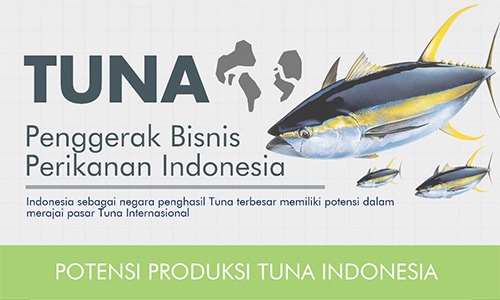NEWS
BACK

The Charm of Tuna as a Driver of Indonesia's Fisheries Business
The tuna fishing business is very enticing. Tuna, a high-migratory fish, has become a favorite worldwide. The high global demand for tuna (tending towards overcapacity) has invigorated the tuna industry year after year. Tuna products, enjoyed by people of all ages, have seen their selling prices soar. As the largest tuna-producing country, Indonesia has enormous potential to dominate the international tuna market.Indonesia is highly significant in the tuna business. According to official FAO data through SOFIA in 2016, 7.7 million metric tons of tuna and tuna-like species were caught worldwide. In the same year, Indonesia managed to supply more than 16% of the world's total production, with Indonesia's average production of tuna, skipjack, and mackerel reaching more than 1.2 million tons annually. In 2017, Indonesia's tuna export volume reached 198,131 tons, valued at 569.99 million USD.There are various types of tuna, including bigeye, yellowfin, albacore, skipjack, and southern bluefin tuna. With affordable prices, tuna is rich in nutrients that help address the malnutrition issues still prevalent in Indonesia. Besides being high in protein, tuna also contains vitamins A, D, B6, and B12 and is rich in minerals. Tuna is also high in omega-3, which is more beneficial for cholesterol and heart health than chicken and beef.The economic value of Indonesia's tuna fishery products trade is significant and represents an opportunity that can be continuously harnessed. However, sustainability aspects must be prioritized to ensure the ongoing preservation of tuna fisheries. The high demand in the global market is the focus of the Directorate General of Capture Fisheries (DJPT) of the Ministry of Marine Affairs and Fisheries (KKP) in managing tuna from upstream to downstream and maintaining tuna habitats.The Indonesian government is committed and consistent in supporting the conservation and management of tuna resources through the development of national tuna fisheries management. This plan was launched during the first Bali Tuna Conference and subsequently established by the Decree of the Minister of Marine Affairs and Fisheries of the Republic of Indonesia Number 107 of 2015.The national tuna management plan aims to implement rules and standards adopted by the Regional Fisheries Management Organizations (RFMOs), where Indonesia now participates in the Indian Ocean Tuna Commission (IOTC), the Western and Central Pacific Fisheries Commission (WCPFC), the Commission for the Conservation of Southern Bluefin Tuna (CCSBT), and the Inter-American Tropical Tuna Commission (IATTC).The national tuna management plan aims to achieve sustainable tuna fisheries management for the welfare of the fishing community. It also supports national food sovereignty, sustainable fish protein supply, increased fisher income, and job creation on fishing vessels and fish processing units, including other supporting industries, which is the national aspiration of the Indonesian government as a maritime axis and the sea as the nation's future.During the second Bali Tuna Conference, the Indonesian government identified priorities for tuna fisheries management, focusing on tuna production data. Additionally, it enhanced the registration system for tuna vessels, especially in archipelagic waters. It also developed and implemented electronic monitoring and reporting systems to address tuna traceability issues and develop regulations related to tuna management.The government has continuously worked to synergize with the fishing industry to protect tuna habitats. The KKP has launched strategic policies and programs to achieve sustainable tuna fisheries management, which will benefit and boost the economy of the tuna fishing community.Through cooperation, the KKP has received support from the Indonesian Pole & Line and Handline Association (AP2HI) and the International Pole and Line Foundation (IPNLF). To strengthen the competitiveness of Indonesian tuna in the international market, the government continues to encourage the tuna fishing industry to obtain certification from the Marine Stewardship Council (MSC). This certification enhances competitiveness, ensures fishery sustainability, secures market access, commands premium product prices, improves reputation, and offers other positive opportunities.At the third International Bali Tuna Conference held this year, a document containing a strategic framework for utilizing tuna, known as the harvest strategy framework, was launched. This document outlines sustainable tuna fisheries management for bigeye tuna, yellowfin tuna, and skipjack tuna in Fisheries Management Areas (WPP) 713, 714, and 715. The MSC certification and joint commitment between the KKP and the IPNLF were also agreed upon.International buyers of tuna products affiliated with the IPNLF, such as Anova Food, Fish Tales, Followfish, Frinsa del Noroeste, Green World Company, Migros Group, MMP International, Sainsbury's, Salica, Sea Delight Europe, SL, Tri Marine, Tuna Solutions, and World Wise Foods, will purchase tuna products at premium prices. The cooperation scheme with MSC and tuna fishery associations supported by IPNLF is free of charge to obtain the certification.The government continues to urge entrepreneurs to ensure tuna fishing adheres to sustainability principles to maintain tuna resources, traceability to prevent IUU fishing, and accountability in utilizing tuna by responsible fisheries management principles. The world can see Indonesia's commitment to preserving tuna habitats by paying attention to these aspects.
